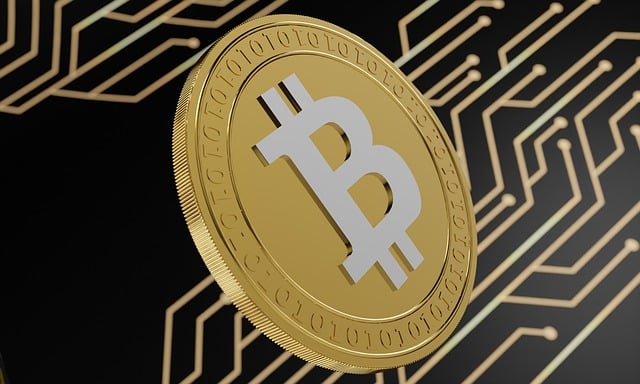
Bitcoin, introduced in 2009, has pioneered decentralized finance (DeFi) by offering a transparent, secure, and accessible peer-to-peer electronic cash system. DeFi leverages blockchain technology to provide lending, borrowing, trading, and insurance without intermediaries. Bitcoin's established network supports complex financial activities through layers like the Lightning Network. This integration offers global financial disruption with potential for lower fees, enhanced transparency, and cross-border transactions. However, challenges include securing DeFi applications on Bitcoin and navigating regulatory uncertainties. The fusion of Bitcoin and DeFi promises innovative financial products, global inclusion, and a more decentralized future, but faces significant hurdles.
In the evolving landscape of decentralized finance (DeFi), Bitcoin has emerged as a pivotal force, bridging traditional finance with blockchain technology. This article delves into the symbiotic relationship between Bitcoin and DeFi, exploring both the opportunities and challenges this convergence presents. We trace Bitcoin’s historical role in DeFi, dissect its disruptive potential, highlight integration benefits, and address regulatory hurdles. By examining the future outlook, we aim to illuminate prospects for innovation and widespread adoption of this revolutionary financial paradigm.
- Bitcoin's Role in Decentralized Finance (DeFi): A Historical Perspective
- Understanding DeFi and Its Disruptive Potential
- Integration of Bitcoin into DeFi: Benefits and Use Cases
- Challenges and Regulatory Concerns in the Bitcoin-DeFi Ecosystem
- The Future Outlook: Opportunities for Innovation and Adoption
Bitcoin's Role in Decentralized Finance (DeFi): A Historical Perspective

Bitcoin, introduced in 2009, is often considered a pioneer in the decentralized financial (DeFi) space. Its core principle—a peer-to-peer electronic cash system operating independently of a central authority—has been a blueprint for many DeFi innovations. Over time, Bitcoin’s network has evolved to facilitate not just transactions but also complex financial activities, such as lending and borrowing, through various layers like Lightning Network and second-layer protocols.
Historically, Bitcoin has played a pivotal role in challenging traditional financial systems by offering a more transparent, secure, and accessible alternative. This has sparked the development of DeFi, which leverages blockchain technology to create open-source financial applications. Today, DeFi platforms enable users to participate in various financial services without intermediaries, relying heavily on bitcoin’s underlying infrastructure and security.
Understanding DeFi and Its Disruptive Potential

Decentralized Finance, or DeFi, is a revolutionary concept that aims to redefine traditional financial systems by leveraging blockchain technology and peer-to-peer interactions. It offers a wide range of financial services, from lending and borrowing to trading and insurance, all on a decentralized platform, eliminating the need for intermediaries like banks. This innovative approach has immense potential to disrupt the global financial landscape, particularly when combined with Bitcoin’s leading role in the cryptocurrency market.
The disruptive potential of DeFi lies in its ability to provide financial inclusion, enhanced transparency, and reduced fees. Users can gain access to various financial tools without geographical restrictions or the need for a traditional banking system. Moreover, blockchain-based smart contracts ensure secure and automated transactions, fostering trust and efficiency. Bitcoin, with its established decentralized network, serves as a robust foundation for DeFi, enabling the creation of new applications that can reshape how we interact with finance in the digital age.
Integration of Bitcoin into DeFi: Benefits and Use Cases

The integration of Bitcoin (BTC) into the decentralized finance (DeFi) ecosystem offers a myriad of opportunities, revolutionizing how we perceive traditional financial systems. As a flagship cryptocurrency, BTC’s strong brand recognition and established security measures serve as a reliable foundation for DeFi applications. One key advantage lies in its ability to facilitate cross-border transactions with minimal fees, addressing long-standing issues in the global payment system. DeFi platforms can leverage Bitcoin to enable borderless lending, borrowing, and trading, fostering financial inclusion worldwide.
Additionally, Bitcoin’s limited supply provides a unique use case for DeFi protocols. Decentralized applications (dApps) can utilize this property for structured products, such as yield farming incentives or stablecoins pegged to BTC, opening doors for enhanced investment strategies and risk management tools. By embracing Bitcoin, DeFi has the potential to attract mainstream investors who value both financial innovation and proven security, thus driving adoption and shaping a more decentralized financial future.
Challenges and Regulatory Concerns in the Bitcoin-DeFi Ecosystem

The integration of Bitcoin (BTC) and Decentralized Finance (DeFi) opens a new frontier in the financial world, offering unprecedented opportunities for innovation. However, this promising ecosystem also presents significant challenges and regulatory concerns. One of the primary hurdles is ensuring the security and stability of DeFi applications built on top of BTC. As DeFi platforms often involve complex smart contracts and decentralized exchanges, any vulnerability or hack could lead to substantial losses, eroding user trust and market confidence in these emerging technologies.
Regulatory uncertainty adds another layer of complexity. The decentralized nature of Bitcoin and DeFi defies traditional financial regulations, leaving a gap in legal frameworks that can adequately address potential risks and consumer protections. Global regulatory bodies are still grappling with how to categorize and regulate cryptocurrencies and DeFi platforms, leading to inconsistencies and uncertainties across jurisdictions. This lack of clarity may hinder the mainstream adoption of BTC-based DeFi and create challenges for developers, investors, and users navigating this evolving financial landscape.
The Future Outlook: Opportunities for Innovation and Adoption

As Bitcoin continues its journey into the decentralized finance (DeFi) space, the future outlook is filled with immense opportunities for innovation and adoption. The integration of these two powerful forces has the potential to reshape traditional financial systems, offering users greater control, transparency, and accessibility. With DeFi platforms leveraging Bitcoin’s underlying technology, we can expect to see more sophisticated financial products and services tailored to meet diverse needs.
The decentralized nature of Bitcoin and DeFi together creates a robust environment for financial inclusion, enabling individuals worldwide to participate in global economic activities. This combination also fosters innovation in areas such as lending, borrowing, trading, and insurance, potentially disrupting existing models and opening doors for new, more efficient solutions. As the ecosystem evolves, we can anticipate heightened security, lower transaction fees, and faster processing times, making Bitcoin-powered DeFi a compelling alternative to traditional banking systems.
Bitcoin’s integration with Decentralized Finance (DeFi) opens up a world of opportunities, from enhanced financial accessibility to innovative use cases. However, as this decentralized landscape evolves, navigating regulatory challenges and ensuring security will be crucial for its widespread adoption. As the Bitcoin-DeFi ecosystem matures, continued collaboration between developers, regulators, and users will be essential to unlock the full potential of this revolutionary combination.






